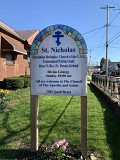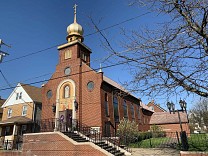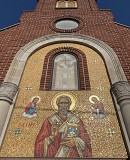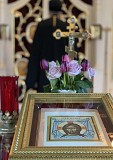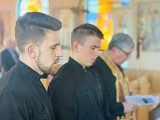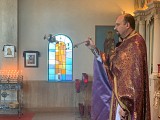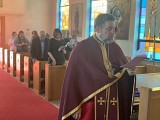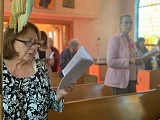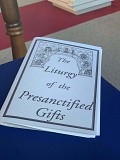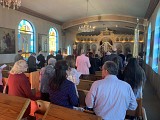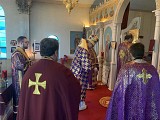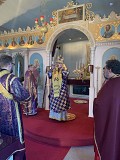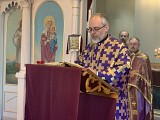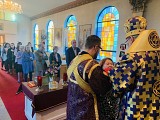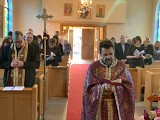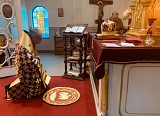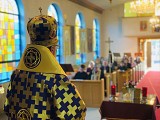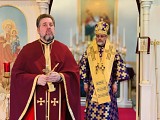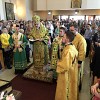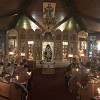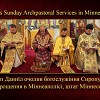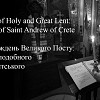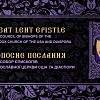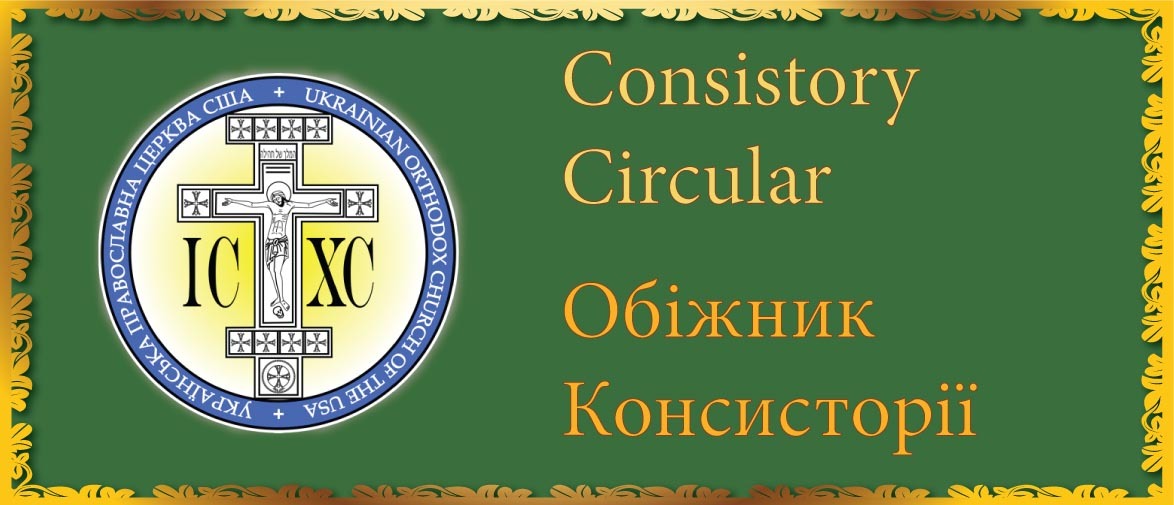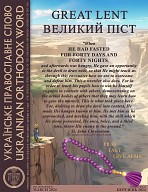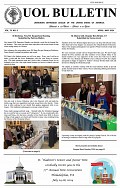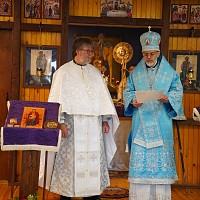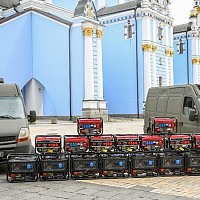The clergy and faithful of the Cleveland, OH Metropolitan area have entered the sacred time of Holy and Great Week with the blessing of His Eminence Archbishop Daniel and his personal participation in the liturgical services of the week.
Having concluded his archpastoral visit to Detroit, MI Metropolitan area, Vladyka Daniel traveled to Lakewood, OH in order to lead the celebration of the Liturgy of Presanctified Gifts at St. Nicholas the Wonderworker Ukrainian Orthodox Pro-Cathedral, where Very Rev. Fr. Dennis Kristof serves the pastoral needs of the parish community.
At the altar of St. Nicholas Pro-Cathedral, Archbishop Daniel was joined by Very Rev. Fr. Dennis Kristof (pastor); Very Rev. Fr. John Nakonachny and Very Rev. Fr. Michael Hontaruk of St. Vladimir Ukrainian Orthodox Cathedral in Parma, OH; Very Rev. Fr. Roman Yatskiv of St. Nicholas Ukrainian Orthodox parish in Monessen, PA; Rev. Fr. Dimitri Bilenky of the Dormition of the Birth-Giver of God Ukrainian Orthodox parish in Lorain, OH. The seminarians of St. Sophia Ukrainian Orthodox Theological Seminary subdeacons Mykola Zomchak, Ihor Protsak, Yurii Bobko and Ivan Venhryn led the choir chanting while responding to the various liturgical petitions.
In his sermon, Archbishop Daniel reflected upon the meaning of the sacred day of Holy and Great Monday, stating:
“The first part of Holy Week presents us with an array of themes based chiefly on the last days of Jesus' earthly life. The story of the Passion, as told and recorded by the Evangelists, is preceded by a series of incidents located in Jerusalem and a collection of parables, sayings and discourses centered on Jesus' divine sonship, the kingdom of God, the Parousia, and Jesus' castigation of the hypocrisy and dark motives of the religious leaders. The observances of the first three days of Great Week are rooted in these incidents and sayings. The three days constitute a single liturgical unit. They have the same cycle and system of daily prayer. The Scripture lessons, hymns, commemorations, and ceremonials that make up the festal elements in the respective services of the cycle highlight significant aspects of salvation history, by calling to mind the events that anticipated the Passion and by proclaiming the inevitability and significance of the Parousia.
On Holy Monday we commemorate Joseph the Patriarch, the beloved son of Jacob. A major figure of the Old Testament, Joseph's story is told in the final section of the Book of Genesis (chs. 37-50). Because of his exceptional qualities and remarkable life, our patristic and liturgical tradition portrays Joseph as a prototype, prefigurement or image of Christ. The story of Joseph illustrates the mystery of God's providence, promise and redemption. Innocent, chaste and righteous, his life bears witness to the power of God's love and promise. The lesson to be learned from Joseph's life, as it bears upon the ultimate redemption wrought by the death and resurrection of Christ, is summed up in the words he addressed to his brothers who had previously betrayed him, “’Fear not ... As for you, you meant evil against me; but God meant it for good, to bring about that many people should be kept alive, as they are today. So do not fear; I will provide for you and your little ones.’ Thus he reassured them and comforted them” (Genesis 50:19-21). The commemoration of the noble, blessed and saintly Joseph reminds us that in the great events of the Old Testament, the Church recognizes the realities of the New Testament.
Also, on Great and Holy Monday the Church commemorates the event of the cursing of the fig tree (Matthew 21:18-20). In the Gospel narrative this event is said to have occurred on the morrow of Jesus' triumphant entry into Jerusalem (Matthew 21:18 and Mark 11:12). For this reason it found its way into the liturgy of Great Monday. The episode is also quite relevant to Great Week. Together with the event of the cleansing of the Temple this episode is another manifestation of Jesus' divine power and authority and a revelation as well of God's judgment upon the faithlessness of the Jewish religious classes. The fig tree is symbolic of Israel become barren by her failure to recognize and receive Christ and His teachings. The cursing of the fig tree is a parable in action, a symbolic gesture. Its meaning should not be lost on any one in any generation. Christ's judgment on the faithless, unbelieving, unrepentant and unloving will be certain and decisive on the Last Day. This episode makes it clear that nominal Christianity is not only inadequate, it is also despicable and unworthy of God's kingdom. Genuine Christian faith is dynamic and fruitful. It permeates one's whole being and causes a change. Living, true and unadulterated faith makes the Christian conscious of the fact that he is already a citizen of heaven. Therefore, his way of thinking, feeling, acting and being must reflect this reality. Those who belong to Christ ought to live and walk in the Spirit; and the Spirit will bear fruit in them: love, joy, peace, patience, kindness, goodness, faithfulness, gentleness, self-control (Galatians 5:22-25).”
Continuing his reflection, Vladyka encouraged everyone to take this opportunity to live the life of a true Christian. He urged everyone to take this opportunity as we enter Holy Week, to make an effort to not only fast, but, to make an effort towards our own salvation and that of others.
Dozens of faithful of the parish family received the Most Holy Eucharist from the hands of their archpastor.
Following the celebration of the Liturgy, the children in attendance presented Vladyka Daniel with flowers and shared with him a bit of their knowledge of the precepts of the Holy Orthodox Church that they have learned in the parochial Sunday school under the leadership of Dobrodiyka Barbara Kristof.
The Archpastoral visit concluded with a small reception in honor of Archbishop Daniel and with the participation of everyone in attendance.
|
| |||||||||||||
